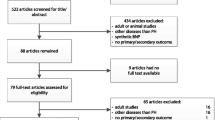Abstract
Continuous intravenous infusion of prostacyclin (epoprostenol) as a treatment for primary pulmonary hypertension (PPH) definitely improves the patient's quality of life, but few accurate parameters have been found to evaluate the efficacy of the treatment. We observed a patient with severe PPH whose plasma brain natriuretic peptide (BNP) level changed significantly as her condition and symptoms changed. Plasma BNP may be considered as one of the parameters for assessing the efficacy of prostacyclin treatment.
Similar content being viewed by others
Author information
Authors and Affiliations
Additional information
Received: July 3, 2000 / Accepted: October 14, 2000
Rights and permissions
About this article
Cite this article
Wakaumi, M., Shiga, T., Nozaki, K. et al. Plasma brain natriuretic peptide as a parameter to assess efficacy of continuous intravenous infusion of prostacyclin (epoprostenol) to treat severe primary pulmonary hypertension: a case report. Heart Vessels 15, 144–146 (2000). https://doi.org/10.1007/PL00007266
Issue Date:
DOI: https://doi.org/10.1007/PL00007266




